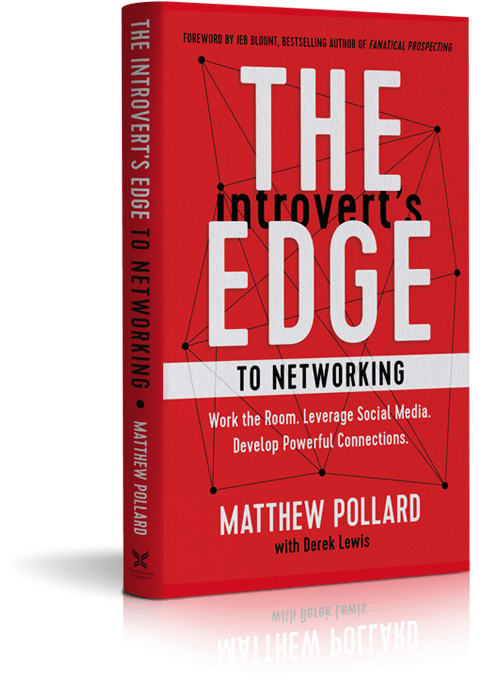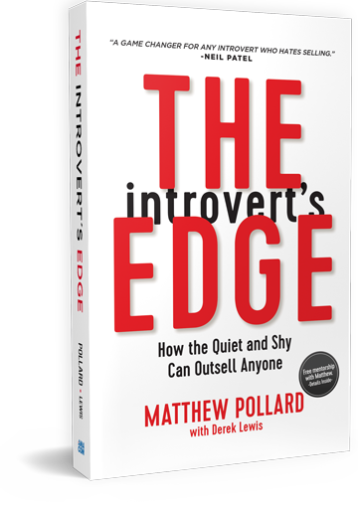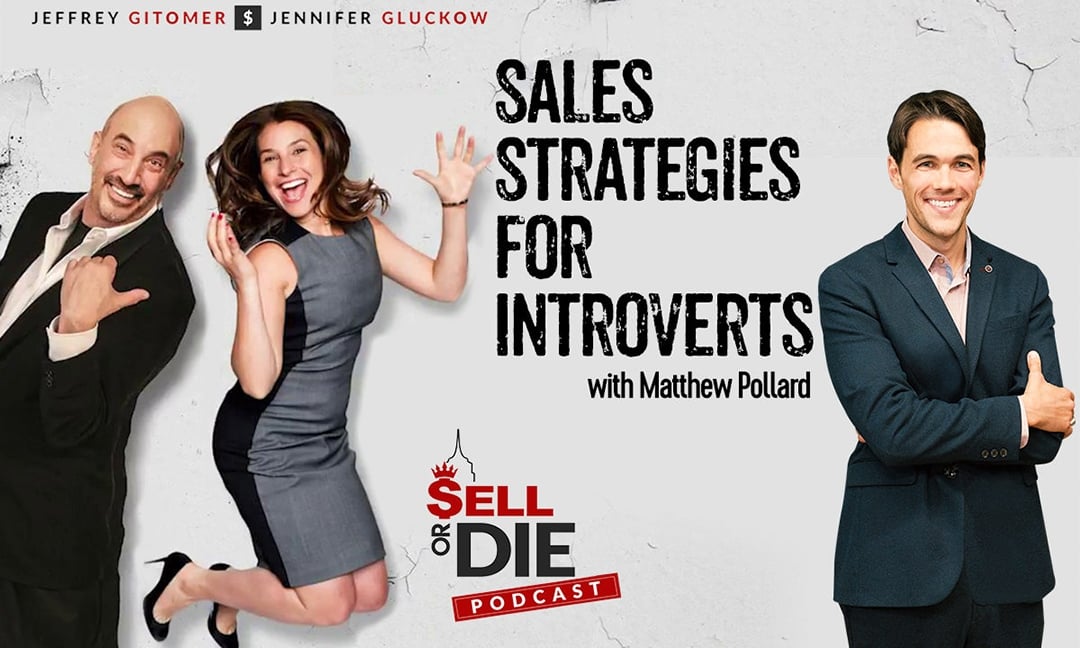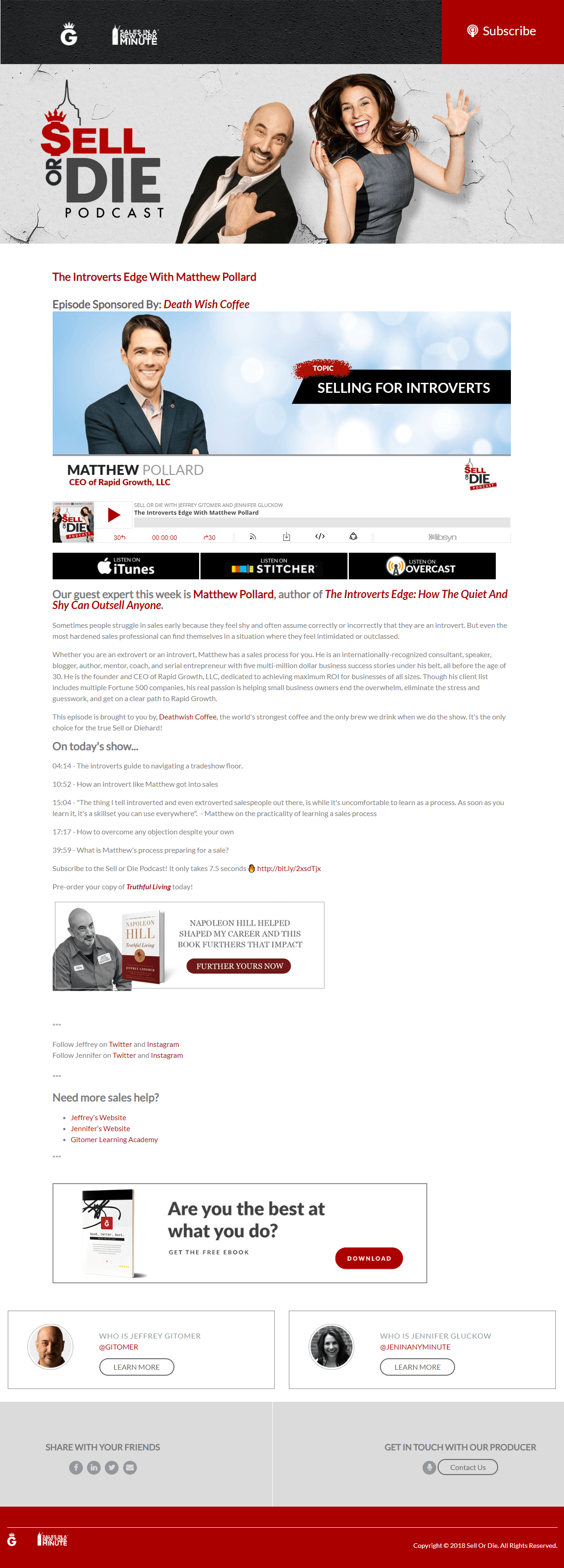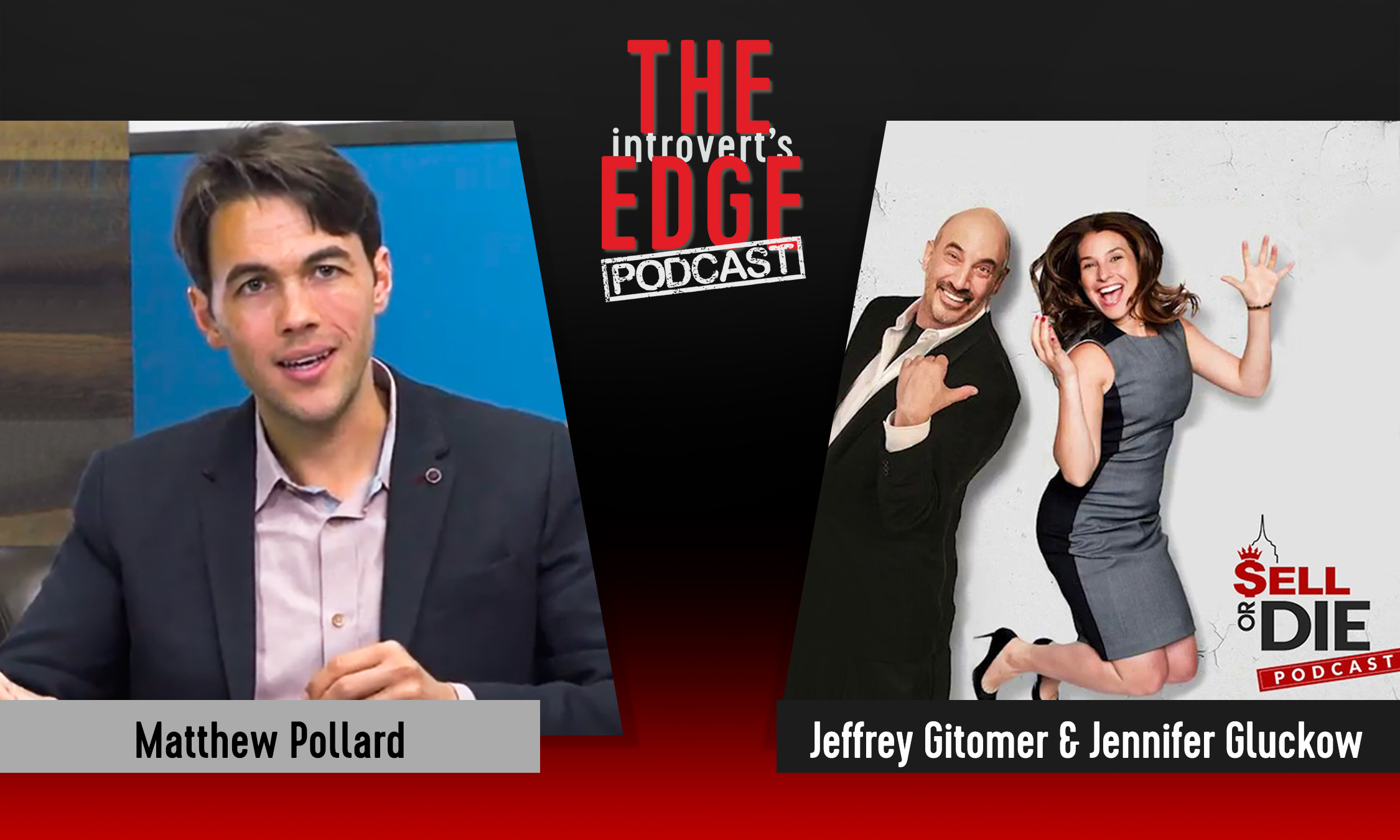Jeff: I am pleased to have here in the studio, live in person, Matthew Pollard. Did I say that right?
Matt: You did, you said it perfectly. You’ve been practicing.
Jeff: Can I just try to explain something? We would say, “Matthew Pollard”, because that’s how Americans talk. Matthew, however, is much more educated than we are, speaks much more sophisticatedly than we do, has an accent that makes us sound stupid.
Jen: Anyway, he’s the author of The Introvert’s Edge and he’s The Rapid Growth Guy, and he is here live and in person, which is amazing. It’s so great to meet you and have you here on our show, Sell or Die, thanks for being here.
Matt: I’m really happy to be here.
Jeff: By the way, for an introvert he also does trade shows.
Jen: I’m not convinced he’s an actual introvert. Can you explain to me what – because I thought I knew what an introvert was – but I expected you to show up and be shy.
Jeff: I expected him to sit in the corner.
Jen: I expected you to be more shy.
Matt: I’ll do that later. The thing you’ve got to realize about introverts is – and I think this is where everyone gets it wrong – they’re like, “Oh, an introvert means that he’s quiet and shy”. Well shyness is something totally different. But introversion, the real difference is where you draw your energy. We were talking earlier about the festival that I run, Small Business Festival. Jim Cathcart spoke as our closing speaker – a close personal friend of mine – he’s an extrovert. He and I both spoke in and were involved in the festival for the whole day. The difference was, at the end of the that he wanted to go down Rainey Street and celebrate and have some drinks and see the live music capital of the world. I wanted to go home into a dark room, put on the TV, and speak to no one for three hours.
Jen: Wait a minute, I might be an introvert.
Matt: Oh no.
Jen: Jeffrey’s also the person who wants to keep going and talk to more people, and I always want to go back to the hotel room.
Matt: It’s funny. The thing that we always tell ourselves is, “Oh, I must be extroverted because I can speak to people, I can network, I can sell.” No. You might be an introvert that has learned strategies for doing that really well because sales, networking, presenting, they’re all skillsets. But introverts don’t see it that way, they don’t see it as a skills gap. They see it as they don’t have that natural ability so it’s just something they can’t do.
Jeff: Or they learn to do it but it’s a little bit more difficult for them to actually perform it.
Matt: Well it’s interesting when you say that, because for me I now actually really enjoy those activities. And while I can write and blog and I can do all of those things, I actually really enjoy dialog like this. I really enjoy presenting from stage. I still get anxious when I go to networking events, but I actually enjoy the activity of networking. However, at the end of that it’s run its toll on me, so I also have to manage my energy. Where an extrovert will do that and then they’ll want to do something else. And they have their own disadvantage, they don’t want to sit in one room by themselves and ride. We all have things to bear. The benefit as an introvert is we can create strategies to go and do those things, too.
Jeff: So I’m going to throw something at you. Let’s go back in history. Do you know Miles Standish?
Matt: I don’t.
Jeff: Come on.
Matt: I’m from the other side of the world remember.
Jen: I’m from here and I don’t know who it is.
Jeff: Miles Standish was a guy who wanted to marry this woman named Priscilla. And he had no balls to go and propose to her, so he sent a guy named John Alden to do it.
Matt: Ok. So obviously Miles Standish was an introvert who was shy, or reserved, or didn’t have the courage to do it.
Jen: He was born in 1584.
Jeff: But the bottom line is, you reached out to me a couple times and ask me to marry you, and I did not. I mean, in a way you wanted to come on the show and I didn’t respond to it. So you got John Alden to call me and say, “Hey, Matthew wants to come marry you.”
Matt: 100%. I think that one of the things that introverts struggle with is they tell themselves these stories about how that person doesn’t like them. It happens all the time. I’ve got one introvert and he’ll have a great conversation with somebody, then he’ll get off the phone and send them the proposal, and then you don’t get back to them. He assumes that they don’t like the idea or they changed their mind, not that they just got busy.
Jen: You can’t be that sensitive in sales.
Matt: Exactly. But you know it’s the same when I reached out to you the first time, you went , “Who is this Australian guy messaging me?”
Jen: Well actually we can’t read an accent on email.
Matt: Well it says, “Australian born” at the first part, but I bet you I didn’t even get that far, right? You would have got the message and it was in a pile of a hundred others, and you wouldn’t get back to all of them. Maybe someone else read them.
Jeff: No, I’m a third-time guy. By the third time I go, “Oh, this guy is serious.”
Matt: Well that’s the mistake I made. I got somebody else to reach out.
Jen: That was amazing because we love and trust Gerhard, and so we automatically like you before we even meet you.
Matt: And I think that’s something that a lot of people forget. They’re afraid to ask their friends for introductions, they’re afraid to ask for help. And introverts especially, we wear our hearts on our sleeves so we’re afraid to tell somebody we have a weakness.
Jen: How did you realize you were an introvert?
Matt: Well actually I think I’ve always known that I was an introvert, but I kind of fell into sales. And that was, “Oh my gosh, I’m an introvert, and I’ve got to do this.” I mean, I had the reading speed of a 6th grader in high school. I was incredibly shy. In some of my presentations I put up this photo of me in my sister’s wedding and I had acne all over my face.
Jen: We saw it on your website.
Matt: When I do presentations I put it up and then I take it down, but I think it’s important for people to realize.
Jeff: You can probably get one of those skin things to be a sponsor.
Matt: I probably could. Well Accutane is what worked for me.
Jen: For those of you that can’t see him, he looks very handsome.
Matt: Thank you for that. For me, I put a photo up of the way I was because people see me on stage and they look at me now and they think, “Oh that guy is an extrovert.” And I’m like, no, you’ve got to see where I came from. I mean, reading speed of a 6th grader, horrible acne, incredibly shy. I was afraid to talk to my on friends and be the center of attention, let alone speak to anyone else. I fell into sales when I took a job at a real estate agency in the back office to find myself for a year, because I got the top 20% in my state, but it was really hard with the reading speed of a 6th grader. I just didn’t have the energy to go straight to university. So I took a year off. I took a job in the back of a real estate agency doing the data entry stuff and my boss comes up to me and says, “Sorry Matt, you’re out of a job, the company is shutting down.” It was just before Christmas, and just before Christmas in Australia we take a month off, it’s our summer and our Christmas break.
Jen: A paid month off, by the way.
Matt: Paid if you’ve got a job.
Jeff: This is incredible. You get laid off before Christmas. You don’t get laid off, you just get fired, there’s no more.
Matt: That’s it.
Jeff: What did you do?
Matt: Well in Australia the only jobs you can really get around Christmas time – I mean, who’s going to hire when people are going on a month break – so I found all these commission-only jobs, that was the only thing I could find in what we called the “Green Glide Classifieds” back then. So I circled all these jobs and I phoned them up, and it turns out they’re all commission-only. So I took an interview at one of them, and I got put in the business team because I’m the only person that showed up in a suit. It was the world’s most ugly suit, but that was it. It as a black suit that I had a lime green shirt and a post office red tie. The suit shined in the sun. I totally looked like Christmas. So I got the job and after 5 days of product training I got ent out on this road, it was called Sydney Road, and it was like 1,000 doors on each side, and I just got told to go and sell. I was about to walk into the first business and I had this realization that no one actually taught me that bit, I knew all about the product but no idea what to say. So I walked into the first door and got rejected. The next door I got told to get a real job. People can be really lovely sometimes, especially when you’re trying to close to them. But it was 93 doors before my first sale.
Jen: Wow. Ok wait, most people would have given up after the 5th, 6th, 7th, 8th, 9th, 10th….93?
Jeff: Actually what was happening is he was making the percentages of cold calling come to life.
Matt: 100%. I mean we all say sales is a numbers game, right? And the truth is, while it is, I’d like to stack those odds a little bit and that’s why you should totally learn to sell. Which is kind of the realization that I had. I mean 93 doors, I made $70.
Jen: What kept you going after the 10th or 11th? I mean, what?
Matt: So I think it was a lot do do with attitude is key, and the way I see sales, attitude is 100% key. And for me there were two things going on. One, was that I really didn’t have any other option. I watched my father work 80 hours a week in a job that he kind of liked but hated the hours, to support us. There was no way I was going to go back to my father after a day of working saying it’s too hard, I’m out. So it was, I’ve just got to keep pushing forward. I had to convince myself, and I think self talk is one the most important things, and I had to convince myself. Everyone’s heard that sales is the gift of the gab – you’ve either got it or you don’t – if that was true, my year was going to suck. So I kept telling myself that sales is a process, one that I can learn, I’ve got to figure it out. And through that 93 doors I can tell you I didn’t figure it out. I walked into that door and he was happening to look for a mobile phone – which is what I was selling – and then I sold him a landline package and and internet package, and I made my first sale. But when I walked out I was excited for about 45 seconds, then I had this realization that I had to do this for the rest of the year. And there was no way I was willing to go back and do that on another 93 doors. So I looked for other ways, but I had the reading speed of a 6th grader so I couldn’t exactly pick up one of your books, or a Brian Tracy, or a Zig Ziglar, it would have taken me a year to read it let alone consume the information and apply it.But at that stage, YouTube was just starting to become more prevalent – and a lot of people think it’s just for cat videos – I actually saw the steps in the sale and started to learn the process.
Jen: Cat videos and makeup, by the way.
Matt: Ok, so I missed the makeup part of the memo.
Jeff: And you left out slime. Sliming’s the new thing.
Matt: Sliming’s the new thing since Nickelodeon bought them out. Well for me it was attitude, too.
Jen: So you watched sales videos?
Matt: That was all I could do, so I watched the sales videos. Sales is like climbing Mount Everest. Once you know how to do it it seems easy, but when you’re learning, it’s tough as nails.
Jeff: It’s a little cold on your way to the top.
Matt: It really is.
Jeff: In fact, your fingers fall off.
Matt: Exactly. We were talking just before about the fact that you used to fly all the way to BNI in New York, and we were talking about how some people just aren’t willing to put in the work for success. And for me I would sell for 8 hours getting rejected and then I would go home and I’d study for 8 hours and focus on the process of one element, perfect that and go back out and try the next day.
Jeff: Smart. Smart move.
Jen: That’s amazing.
Matt: It was the only way I could do it. I mean, it was 93 doors, and then it was 78, and then it was 45, and I eventually got it down to under 10 doors a sale.
Jen: Way to go.
Matt: And it was amazing to see how quickly I went from being horrific at sales, terrified to do it, to becoming…well, I got promoted seven times in 12 months. My boss pulled me in about 6 weeks in, he just got the monthly sales report, and I was listed at the top as the #1 sales performer. And this was a company that just happened to be the largest sales and marketing company in the southern hemisphere. Australia is pretty small, but the southern hemisphere is pretty big. He was blown away and so was I, and that’s why I got promoted so much. But the thing that I always tell introverts out there – and even extroverted sales people out there – is while it’s uncomfortable to learn the sales process, as soon as you learn it it’s a skillset that you can learn everywhere.
Jen: Ok, so you mentioned BNI and I was going back and forth, I was very involved in a group, and we had about 60 entrepreneurs or sales people. And what I found with a lot of them was they were really good at their skill or craft, so if someone made cupcakes for example, she was the best cupcake maker on the planet. But when it came to selling those cupcakes, she felt like she couldn’t do it because she was a little bit more introverted. So what do you recommend to business owners like that where they have their skill or craft, they’re great at that, and they don’t understand the sales part of it?
Matt: Yeah sure. So there are a couple of key elements there. The first thing is that a lot of introverts especially, but I’ve seen it happen with extroverts as well when they’re selling themselves, because for the first time they’re trying to out their own heart on their sleeve, is that they start trying to tell you – even if they’re relating features their benefits, they’re trying to tell you why it’s so amazing. And what happens is the logical mind will listen to that and they’ll say, “Yeah, I don’t believe that”. This happens a lot in cold calling especially where somebody gives you an objection and you hit them with all this logical fact. And what I always suggest is to just tell a story. When somebody is explaining what is it you do, you can explain what it is you do at the start, and then say, “Let me give you an example.” And you tell a story of a client just like them that had a similar problem or somebody that’s similar to them and assume the problem. And if you understand your niche really well and if you do that well, then you will be able to talk directly to their problem. And you give them an example of someone that you worked with that you gave them the outcome. Stories have these really unique way of first disarming the listener because it diffuses the logical mind, or short circuits it really, and you speak directly to the emotional mind. We’ve all listened to stories, if I was to tell you Goldilocks and the Three Bears, you’d listen to it and determine the moral, but you wouldn’t say, “Hang on a second. Sorry, Matt. Bears do not have beds, they don’t eat porridge.”
Jeff: I’ve never even eaten porridge.
Matt: Well I have.
Jeff: Let me throw this at you. What you have described, first of all, the sales emotionally justify logically. Second of all, the gift of gab is one thing, the science of selling is quite another. So you can have the gift of gab and literally that’s how I progressed. I had the gift of gab but didn’t understand the science of selling. Once I learned that I was able to combine those two skills and really make it happen.
Jen:You do have the gift of gab, honey.
Jeff: I do. I talk to everybody.
Matt: You know what’s funny though? The gift of gab for a lot of sales people can actually be a limitation. Because while an extrovert has an advantage at the beginning because they can naturally sell and they can naturally talk, and an introvert has a horrible disadvantage because, well let’s just face it, they don’t. When they get to the sales process and they learn the sales process, they’ll actually beat the extroverted sales person.
Jeff: It’s not a system, it is a process. But for those of you who are tweeting, for you diehards out there that are tweeting, why don’t you tweet this one. It’s an expression I’ve had for a long time. Most salespeople are not willing to do the hard work that it takes to make selling easy. Now what Matthew did is go home and worked. Instead of slamming doors and telling his friends that this sucks and I’m not going to do this anymore, he actually studied what to do to win. Way to go.
Matt: Well I appreciate that. I mean, you did the same thing though. You’re an extrovert, which means you didn’t need to learn the science of selling.
Jeff: Oh, I did,
Matt: You did?
Jeff: Yeah. I talked all damn day and didn’t ask for the sale.
Matt: Have you seen extroverts do that? I’ve seen them in doctor surgeries where they say, “I’ve got 20 minutes, go!” And they’re still building rapport for the first 20 minutes.
Jen: Yeah. And they don’t even get to what they want to offer.
Matt: Exactly right. I find that for introverts if they’re willing to do – and it’s not a lot of work – I mean, the person you just talked about that was great at cupcakes, she probably spent forever learning how to do that.
Jeff: Exactly. Maybe been baking cupcakes with her mom since she was 5 or 6 years old.
Matt: Well I did a workshop at the National Freelance Conference in Austin, and I do this thing where…one of the things I love about the sales process is that it breaks so many barriers. But realistically if you have a strong unified message that separates you in an understanding niche, that it just makes it so much easier. Now I was doing this workshop with people on how to do that. And I said at the end of it, “Who here now has a strong message that separates them from everyone else, and they feel so much more confident in going to articulate what they do where they’re not going to be seen as a commodity and get put in that price box?” And 97% of the room puts their hands up. Here’s the sad thing though. I said, “Keep your hands up if this is more time that you spent on marketing since you started your business.” And 85% of the room kept their hands up. So that lady that struggles with cupcakes, my bet is she’s probably not read a sales book. Or, she might be like Brian Smith – the founder of Ugg boots – I interviewed him on my show and he said he never got more than three chapters into a sales book without throwing it down and going, “That just doesn’t work for me.”
Jeff: Well it doesn’t resonate or he can’t see himself.
Jen: He hasn’t read your books.
Matt: They’re not willing to push through the first part of difficulty because they love making cupcakes, they love the boots. But they’re not willing to do the little bit of hard work that allows them to lead their dream business for the rest of their lives. It was 6 weeks for me to go from zero to the best in the nation. But these small business owners, they don’t need to be that good.
Jen: It was 6 weeks that you invested 8 hours a day, and maybe even more on weekends when you didn’t have your full-time job. So think about how many hours that is.
Jeff: The cupcake lady forgot about all the cupcakes that went flat and never rose, or the eggs that broke, or the batch that didn’t turn out well. She forgot about the trial and error of her early life and couldn’t equate those to sales.
Jen: By the way, there is no cupcake lady. But I just thought that would be a good example.
Matt: It’s a great story example. I like it.
Jeff: However there was one lady in BNI when I used to go to meetings with Jen, a photographer lady whose slogan was,”We shoot your family so you don’t have to.”
Jen: She is amazing.
Matt: Well that would definitely get your interest.
Jen: If you’re in New York City and need a photographer, she is an unbelievable photographer.
Matt: Well the thing she’s really done though is she’s separated herself from everybody else. So she gets people on the hook and people are like, “Sorry what now?”
Jeff: Exactly. That’s a good tagline.
Matt: BNI is great at getting people to do taglines. I’ve got an interview coming up with the founder of BNI. I did one on the book, but I’m talking about differentiation in a session together at his house. And one of the biggest problems that introverts and a lot of people at BNI have is creating this 30 second infomercial of what they do. My mother was heavily involved in BNI and I told Ivan it’s what paid my school fees growing up. But her problem was unless she got to do one of these dance cards where she sat down and did what she does for somebody for free, she wouldn’t get any clients. And I think the reason for that is a lot of times one of the biggest struggles that we have as business owners is we come from this employment world where if we want to get the job we have to define ourselves by the title. So, “I’m a copywriter”, or “I’m a bookkeeper”, I’m an accountant”. And when you’re trying to be your own business, if you define yourself by that, you’ve commoditized yourself.
Jeff: Right. The bathroom is going to get dirty once in a while, you’ve got to take out the trash.
Jen: A lot of people think BNI is not for them or whatever, and that’s fine. It’s for some people, it’s not for others. But I will tell you the personal development you get just from going to that kind of meeting every week, giving your pitch to a group of people who are willing to give you feedback and can be kind about it, is amazing. I had one girl in my group who stood up and on the first session literally could not get through her 30 second commercial. She was so nervous. I guess you would define her as an introvert. As the President I quickly jumped up, because I didn’t want anyone to feel awkward, and I said, “Ok, tell me your name.” And she could do that. And then, “What do you do?”, and “Why do you do it?”, and “Who do you want to meet?” And she just started answering questions. Fast forward two years later and she was getting up there with props and things to show and she evolved. But it’s that practice.
Matt: I think what you defined though, see this is an innate skill introverts have, they are sensational at preparation and they know if they have to go into an event that they’re in control of they will prepare. But with sales, networking, presenting, they don’t know they can.
Jeff: There’s the unknown factor, that’s correct.
Matt: And I think the biggest hurdle there, because what you just basically stated, is by the time that you finish – as soon as you helped her – she got it done and it would just naturally come off her tongue. Because she prepared it beforehand, and she practiced it, and she was then on track and she probably did it more amazingly then a lot of extroverts. But she didn’t know she had to prepare it the first time.
Jen: She became one of the stars. Two years later it’s like, do you remember that time you stood up and could barely say your name. And she’s like, “I know!” But it’s amazing.
Jeff: So Matthew, you met and became friends with Gerhard, who is a great guy. His M.O. at the moment is mindset. Did you become involved with him because of that?
Matt: Well actually I was introduced to him through Judy Robinett who wrote the forward for my book. When I first got into town she read an article I wrote for Entrepreneur and she reached out to me because she was interested in some of the strategies. She moved out of corporate world and moved into running her own business and she was struggling with the pricing conversation because she was an introvert, too. So I gave her a strategy for doing that and she became a big fan of mine and I of hers. I mean, she’s a wonderful connector. And she introduced me to him and we’ve just been great friends ever since. I think outside of a few weeks we speak almost every Wednesday. So we chat a lot.
Jen: Wow. We don’t get to speak to Gerhard every Wednesday. That’s bullshit!
Matt: Well the thing is, I think he uses me as a little bit of his test subject. Because for me the introvert that I was and everything that I do now, he’s got this thing called “mindset science”, which he believes now, very similar to you, that sales is mostly about attitude. So for me he asks me questions all the time, because for me when I see a barrier I’ve learned to assume that there’s always an easier way around it. So I look for a system, or I look for a strategy, or I look for information I can synthesize to be able to perform in that area, and Gerhard loves asking me questions about how I do that.
Jeff: Ok, I’d like to throw one other thing into this. You came to America at what age?
Matt: I would have been about 30, just about to turn 31.
Jeff: Ok. And did you come here because you wanted to complain about things?
Matt: Absolutely.
Jeff: You came here because it had promise.
Matt: Absolutely. Australia is a beautiful country, but there’s 22 million people, that’s the population of Texas across the landmass of the United States. It’s crazy.
Jeff: So the bottom line that I’m trying to convey to you diehards is, Matthew showed up with a positive anticipation that he would be more successful here just because he put his feet on the ground. And you guys out there are bitching about the weather and you’re talking about who got elected and who didn’t get elected. My recommendation is follow Matthew’s book about go home, study where your expertise is, get a better mindset around what you’re trying to do, and then go out every day and do it even if your ass falls off. That fair?
Matt: I couldn’t have said it better myself.
Jen: So one of the things that you brought with you is your past history of success, being the top salesperson, going from not really knowing how to sell and being scared of it to being the top salesperson in your nation. So our diehards, you need to figure out what’s your past history of success, because that will help build your confidence. I’m sure that helped you when you came here.
Matt: Absolutely. I mean you’ve got to have your stories. What I’m well known for is I went from nothing to being the #1 salesperson in the nation, but then I was responsible for five multi-million dollar businesses in Australia. So I have a lot of those stories. So one of the questions I always get asked is, “But I’ve got no stories.” Like, what do you mean you’ve got no stories? Everybody has stories. The problem is that they haven’t practiced them. The best example I can give you is that when people talk about how they met their wife or husband. At the start when somebody asks you, it’s kind of a little bit of a bulky story. But over time it becomes this theatrical masterpiece. You get so good, you say this part and I say this part, and it just becomes amazing while they practice that over and over by telling it over and over. In sales they really haven’t had the chance to think what stories work and how do I articulate them in the most successful way to imbed credibility, value, and send the moral that I’m the only logical choice.
Jeff: And not embellish them too much.
Matt: Well most people don’t need to when they realize what they actually did for someone. I mean everybody has worked for a business where they’ve given a result and then they go into business for themselves a lot of times because they want to do it their way. But they can still draw on those stories, they’re still their customers that they worked with. So a lot of people really struggle with how do I find those stories, because I’ve started my business today and now I have no stories. But they forget they have a lifetime of experience and a lot of introverts put up a company brand because they want to hide behind that and they forget that they personally themselves have a lifetime of stories they can draw upon.
Jeff: So I’m going to give you the tip that was given to me by Elizabeth Jeffries who doesn’t claim ownership of it. If you want stories, go back and picture yourself in the house that you grew up in and put yourself in each room of that house mentally, and stories will start to pop. That’s number one. Number two, I would add to that, go back to your original office, your original boss, your original customers, and put yourself in your offices or their situation. I promise you stories will pop. I promise.
Matt: I couldn’t agree more. So many people don’t realize how many stories they have. Derek Lewis, my co-author with the book, he was my ghost writer originally and I turned his business from struggling to make about $12,000 to making just shy of $300,000 within a really short period of time. And I’m like, I want you to tell your story in the book.
Jen: Oh I saw him on your video.
Matt: Yeah. So Derek, we use this analogy. You’ve seen Wizard of Oz where he comes out from behind the curtain. We use that analogy. So he comes out and the reason I wanted him to tell his story – and the whole book is full of stories – but his story specifically is he learned the sales process and he went from making $27,000 in 2013, $12,000 in October of 2014, and then $40,000 within 2 weeks, $80,000 within 6 weeks, $120,000 by the end of the year, and then just shy of $300,000 the year after.
Jeff: He changed his life.
Matt: But then he stopped using the process. He got confident and he started to go out in his own way. And all of a sudden his sales plummet and he calls me. He goes, “Matt, the market has changed.”
Jen: Oh, let’s blame it on the market.
Matt: Right. So all of a sudden this is happening. And I said, “Derek, are you still using the process that we came up with, are you still using the same stories?” And he said, “I might have changed a few things.” He goes back to using the same stories and the same process, and all of a sudden he’s in Switzerland and London doing ghostwriting deals.
Jen: Wait, did the market change that time?
Matt: Absolutely, almost overnight. So the thing is that a lot of people move away from a process. But going back to the story element, as a ghost writer one of the biggest fears for people writing their own book is I don’t have these stories and you write books that are all full of stories, so I’m not going to be able to work with you. What he finds is after about a 30 minute interview, all of a sudden all these stories come out and he’s like this is three books not one. But yet people don’t thing that they have one because they don’t use a business lens to look at their life and realize that every story that they’ve had throughout their entire journey has a business application.
Jeff: Jennifer and I always talk about advice that we’ve gotten from our dads or moms, and those are stories. And those stories actually are the foundation for our success. Literally.
Jen: That’s true.
Matt: I couldn’t agree more. I mean, I told you beforehand that my great grandfather worked in a mining town in Wales. And my grandfather was in the military and then came over here and worked in a factory. My dad was the first one to get a degree. And while most people will think that that’s just a great story of life, it’s actually a story about how we build off our family’s successes and our family’s journey. Because I was allowed to do what I did because my father struggled and got the first degree in our family. And that is a whole story about the generational gap really.
Jen: If you think about the opportunity you’re creating for your future.
Jeff: Yeah. Your kids are going to have it easy.
Matt: Well I hope so.
Jeff: We have a tendency as a society to spoil the shit out of our children. I would tell you that I was never spoiled, that’s not true, I was spoiled.
Jen: I was spoiled. I didn’t act spoiled, but I was definitely treated very nicely by my parents.
Jeff: I’m calling bullshit on that.
Jen: I did not act spoiled most of the time.
Matt: So you believe you weren’t spoiled, and that’s the important thing.
Jen: I believe that my parents spoiled me, but that I still didn’t’ act spoiled.
Matt: I think I was spoiled where it didn’t matter. But I wasn’t spoiled where it did matter. I remember wanting my first computer as a kid and my father said if you want that then that’s something you’re going to have to go out and figure out how to earn. And so I did. And I remember I’ve got a cousin of mine that was a partner in absentia and his daughter worked there for 14 months to pay for her first car because he believed that was an important thing for a child to learn that money actually has a value. So I think in America and Australia and any first-world country, we have a real blessing that we can supply our children with so many amazing things. But I think it’s great parenting to decide what they do supply and what they don’t.
Jen: I agree with that.
Jeff: So we have these diehards out there that are salespeople, and some of them don’t want to make cold calls, some of them have what we refer to in sales as reluctance. They don’t want to make the next cold call because that’s where the next sale might be. So I’ve injected humor as part of what I use, but I’d like to know how you encourage people to stick at it and not quit.
Matt: Well there are two things. There’s a commitment to doing the work, and then there’s a preparation element. For me, one of the things I would always do when I first started one of my businesses and whenever I hired somebody is I would book in their schedule and mine cold call time. Now in Australia BHP was like that client that everybody wished they had. So I would call it, “BHP time”, because I didn’t know if the next person I called was going to lead to a sale with BHP. So for me I think one of the most important things is locking in that time. Now I suggested this to a guy that did gift bags for corporations. And there would be times where he’d go, “Matt, I’ve got no clients. I don’t know what to do.” And I’d say, “Book in this BHP time into your calendar and things will change.” Now of course we worked on scripting, and we’ll talk about that in a second, but he booked that in and then a month later he’d be complaining he’s got too many clients. And then all of a sudden he’d come t me and say he’s got no clients, and I’d ask if he maintained the BHP time. And he’s like, “Well no, I’ve been busy.” So this is one of the things we tend to do, we go from starvation to all of a sudden we’re now overly maxed with clients and we don’t have time for selling. What we’re actually doing is subconsciously avoiding it. I’ve got an article I wrote for CEO Magazine which says, “Dedicate 20% of your time to less stress and higher prices.” Because when we get desperate we then cut our prices to get our next set of clients, and we get in this constant roller coaster. So what I talk about in the article is, even in your busiest time, you deliver 4 days a week and you dedicate one day to sales and marketing activities. And I think that’s a good philosophy to have.
Jen: This is sales gold. Whether you’re an introvert or an extrovert, this is the common thing. This is common, this happens all the time with salespeople. They get up on that roller coaster of I’ve just made so many sales and I beat my quota for the month, and they stop making the calls they need to make or the meetings they need to make.
Jeff: And then all of a sudden their pipeline is empty.
Jen: Exactly. This is sales gold.
Matt: Well I think that so many people just avoid it, right? Especially introverts. It’s an uncomfortable process so unless it’s locked in our schedule. You can move the activity, but you can’t move it out of the week. So if somebody calls you and says can you come and do that meeting, you can move that forward a day or back a day, but if you move it from the week then you’ll keep putting it off. The second thing is to have a planned process. So many people they’ll get on those calls and say it’s really difficult, and they’ve done no prep time. It’s like we all go to these networking events – like the cupcake lady – and didn’t know what to say. She did no preparation, so she spent money to join BNI, she traveled there, she put all of this energy into it, but didn’t know what to say when she got there because she didn’t read a book on networking. I mean, Ivan’s got how many books on that?
Jen: Yeah, exactly.
Jeff: I think that what you’re looking at is this is a very important thing for you diehards. You’re out there listening and you have to take your game plan all the way to the edge. You take your calendar and you mark the things that you’ve got to do, and you don’t mark them out, you just move them over. That’s what you’re saying, correct?
Matt: Absolutely.
Jeff: And when you get there you have to be ready to deliver. If you’re not ready to deliver you’re not going to deliver. It’s just that simple.
Matt: That’s exactly right. It’s like somebody getting into the Olympics as a 150m sprinter and going, “What, was I supposed to practice running before?”
Jeff: Exactly. I have always said that there’s no fear of speaking, it’s just that you’re unprepared.
Matt: 100%. I mean I’m doing an interview with you guys now, and while people listening are probably going, “There’s no way he’s an introvert.” I mean, I did a presentation on Saturday and I had people calling me bullshit saying they didn’t think I was an introvert. And I said that what you don’t see is the preparation I did beforehand.
Jeff: To give you the confidence.
Matt: Because for me, you know, I’ve got big events coming up and I’m speaking to an audience of 14,000 people coming out, 3,000 sales people coming up for a large corporation. But for me to be able to do that, I have to first psych myself up, do a lot of self talk to remind myself that they need me to stand at the front of the stage and tell them these things. And secondly, I know that while now I’ve done so many presentations that I know that I can’t get knocked off by an odd question. In the past it was, I need to know what slide is coming up next every time. Because if I start talking about something that wasn’t the next slide, I’m going to get concerned and it’s going to knock me off my game. So preparation for me is huge, yet most people think that it’s something they do off the cuff. And that’s just not the truth.
Jen: But how do you psych yourself up? Give us specific strategies for other diehard introverts out there so that they know what can they do.
Matt: Well I think the first and probably the most important step for all introverts is to admit to themselves that this is a skillset like any other. It’s a skillset that they can learn. And especially for introverts what they need to do is they need to say, “Ok, if it’s a system then it’s about experimentation.” So if you have a scientist that’s working on an Apple Mac, and the first Apple Mac they press the ‘power’ button and it doesn’t switch on, and they go, “Oh gosh, I was never meant to build computers.”
Jeff: Right, exactly. I’ve had that situation happen several times, by the way. Where I’ve hit the button and it didn’t turn on.
Jen: Well, that might not be your skillset, Jeffrey.
Jeff: It is not my skill set.
Matt: I guess that you’re never meant to use a computer for the rest of your life.
Jeff: No, I just Google. Well actually I ask Jen to Google.
Jen: No, he asks me how to do it and I say let me ask Google.
Matt: Well Google is incredibly helpful. The amount of times that I see people bringing phones into interviews now because they’re researching the thing you’ve said to be able to follow up on the next question.
Jen: Ok, so you psych yourself up. Tell us how exactly.
Matt: So the first thing that I do is I have to believe that for me sales and an interview like this is an experimentation. So for me I have to plan stories that I know I’m going to utilize, I have steps that I’m going to go through, and now that I’ve done it so much it’s less of a thing for me. But I used to for a podcast interview, I used to look at the flow. When I’m going into a sales activity I would practice the steps and know the chapters. My last business was an educational facility and we had 350,000 business owners as students, but the sales script was 12 pages long, and everybody had to learn it before they walked out of the door. And what I found is the success ratio of all the sales cycle would be so much shorter, and the effectiveness of a salesperson would be so much quicker if they learned the sales script before they went out there. So by filling arms with the process – and my book in chapter one, which you can download for free on my website – in the book I talk about a 7-step process. And I say if you do nothing more than write down the headings of the 7-step process, record what you currently say and out that in. If it doesn’t fit then throw that out. You should not be saying that to a customer.
Jeff: Or modify it to a point.
Matt: Exactly. And then look at where the gaps are. And generally people have a huge gaping hole in asking the right questions, and telling stories as opposed to just giving them lots of meaningless data. Fill in those gaps, and if you do nothing more than that, you’ll double your sales in the next 60 days. But there are two reasons for that. One is, you’ve now got a process. But secondly – and this is a huge mindset thing – for me I have a system that’s external to me.
So if a person says “no”, they’re not saying no to me, they’re saying no to the process which is over here. And I say, which element in my experiment didn’t work, adn let me work at fixing that so I have a better result next time.
Jen: So you’re taking the rejection out of it being personal. You’re removing that. I love that.
Matt: Well Brian Tracy talks about in his book, The Psychology of Selling, that getting rejected is a very similar feeling as getting spanked as a child. And you have that “ughh” feeling. It’s the same as dating. A lot of men struggle with approach anxiety when it comes to dating because that feeling of rejection is horrible. But the way to get over that is to approach more people, in selling or in dating. It really works the same way.
Jen: Build up your female pipeline.
Jeff: I’ve never been rejected like that.
Matt: Well maybe we’re not all as pretty as you, mate. But yeah, it’s really about making it external. So for me I know if they reject the solution, there’s either a solution mismatch or there’s a sales pitch mismatch. But it’s never something where I go, “Why didn’t they like me?”, and I judge myself. And that means that my resilience is much higher, and I can go into the next one like that one didn’t happen.
Jeff: There’s an old story about a guy that stood on the corner of 34th and Broadway and asked every woman that walked by if they wanted to go on a date. And he would get rejected like 1,000 times a day, but had five dates.
Jen: That’s like enough for the week.
Matt: I went to Brazil with that guy. He would walk up to every girl and ask. But he did, he had more dates than everyone.
Jeff: So let’s thank Matthew.
Jen: This is incredible.
Jeff: Well we’re also going to invite Matthew back because he lives close by, or relatively close by, and he’s probably going to move to Charlotte anyway.
Jen: He just doesn’t know it.
Jeff: Exactly. Most people migrate from one end of North Carolina to the other. But it’s been a pleasure to watch you succeed. It’s been a pleasure to look at you and say, ok, you landed here with basically you had a past history of success but you’ve turned it really into a business that’s helping a lot of people.
Matt: I appreciate that.
Jeff: And that random act of kindness thing is not unknown to people. We just talked to Chester Elton about random acts of kindness, I’ve been preaching random acts of kindness for a long time, and you do it literally daily.
Matt: Yeah, I like to help a lot of people out. I grew up watching small businesses die and families break up. It happens a lot, and it happened a lot in my area, and that’s why I created a festival that runs nearly 150 free events across America next week, just to help people during Small Business Week. I think that once you succeed you shouldn’t ever forget where you came from. And because of that I like to give back.
Jeff: If you want to do a random act of kindness you hire us as speakers because we’re not going to do it for nothing. In the meantime, we thank you for coming halfway around the world, landing close by, and then showing up.
Matt: You’re very welcome, mate. I was very happy to be here. Thank you.







